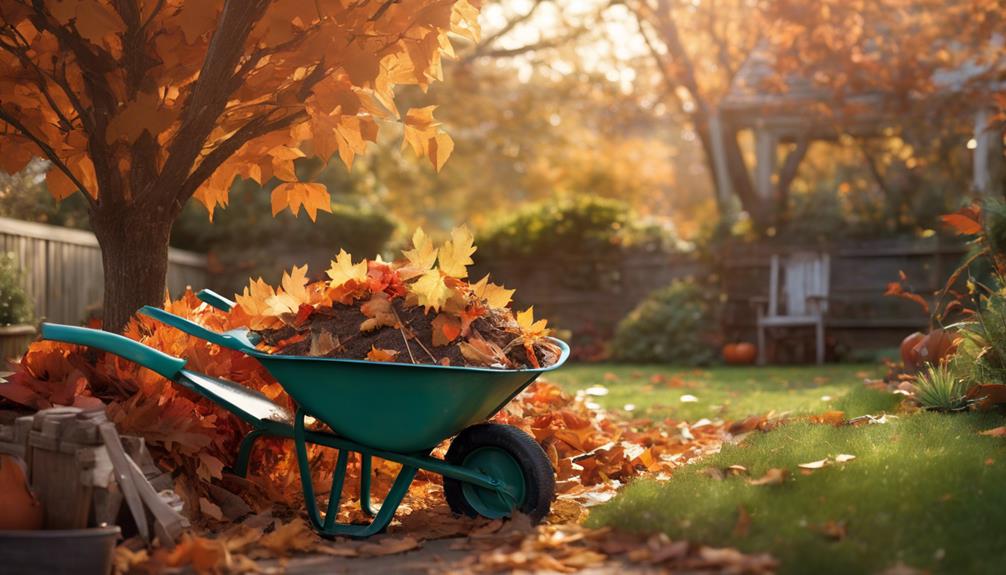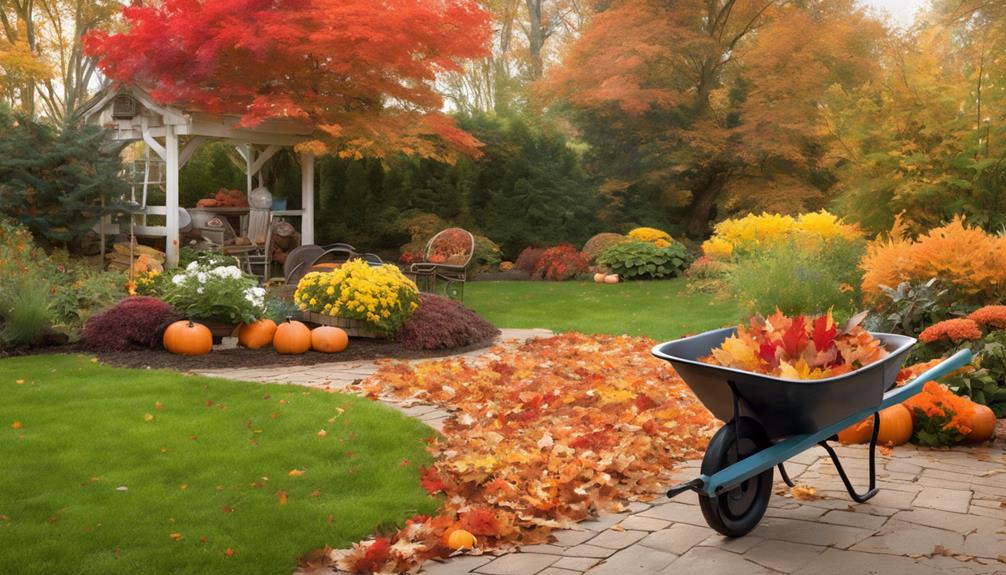Top Tips for Successful Turf Laying and Care
8 January 2025
Why Choose Affordable Garden Fencing Installation?
8 January 2025Prioritising seasonal garden cleanup and maintenance is essential for optimal plant health and ecosystem balance.
This process enhances air circulation and light penetration, rejuvenating soil nutrients and promoting vigorous root development. It also plays a significant role in pest and disease control, as the timely removal of debris prevents infestations and reduces habitats for harmful organisms.
Improved soil quality elevates microbial activity, enriching nutrient availability and water retention. Furthermore, such maintenance fosters biodiversity, creating habitats for beneficial insects and pollinators.
Understanding these benefits can greatly enhance gardening efforts as you explore effective strategies for seasonal upkeep.
Seasonal Garden Health Benefits
Maintaining a seasonal garden significantly enhances plant vitality and resilience.
Regular clean-up and maintenance practices not only encourage healthier growth but also play a crucial role in pest and disease control.
Improved Plant Vitality
A well-executed seasonal garden tidy-up greatly enhances plant health, fostering a robust and thriving ecosystem.
By removing debris, dead plant matter, and invasive species, gardeners can improve air circulation and light penetration, both essential for optimal photosynthesis. This meticulous approach allows for the rejuvenation of soil nutrients, promoting root development and overall plant vitality.
Furthermore, seasonal maintenance encourages the growth of beneficial microorganisms, which play a critical role in nutrient absorption and soil structure.
Regularly tending to your garden also minimises competition for resources, ensuring that desired plants can flourish.
Ultimately, prioritising seasonal cleanup and maintenance cultivates an environment where plants can thrive, leading to a more vibrant and resilient garden landscape.
Pest and Disease Control
Effective pest and disease control is integral to seasonal garden health, directly impacting plant vigour and vital ecosystem balance.
Implementing a proactive approach, such as regular monitoring and the use of integrated pest management (IPM) strategies, minimises the risk of infestations and disease outbreaks. This entails the identification of pests and pathogens early, utilising biological controls, and promoting beneficial organisms that contribute to a healthier garden environment.
Seasonal clean-up is critical; removing debris and diseased plant material inhibits pathogen proliferation and reduces pest habitats.
Furthermore, maintaining ideal soil health and plant diversity fortifies resistance against threats.
Soil Quality and Nutrients
Soil quality is crucial for a thriving garden, as it directly influences microbial activity, water retention, and pest control.
Enhancing these aspects not only promotes plant health but also fosters a balanced ecosystem.
Understanding the interplay between soil nutrients and these factors is vital for effective seasonal garden maintenance.
Microbial Activity Enhancement
Enhancing microbial activity is essential for maintaining optimal soil quality and nutrient availability in gardens. A flourishing microbial community contributes to soil health, enabling plants to access vital nutrients more effectively.
To boost microbial activity, consider implementing the following strategies:
- Organic Matter Supplement: Incorporate compost or well-rotted manure to provide a nutrient-rich environment.
- Crop Rotation: Varying crops annually helps prevent nutrient depletion and promotes diverse microbial populations.
- Minimal Tillage: Reducing soil disturbance preserves microbial habitats and improves soil structure.
- Mulching: Applying organic mulch retains moisture and fosters a conducive environment for beneficial microorganisms.
Enhanced Water Retention
Maintaining ideal soil quality not only involves fostering microbial activity but also ensuring effective water retention.
Improved water retention is essential for sustaining plant health and nutrient availability. Proper water management leads to better growth, resilience, and productivity in the garden.
Consider the following strategies to enhance water retention:
- Organic Matter Addition: Incorporate compost or well-rotted manure to improve soil structure and increase moisture-holding capacity.
- Mulching: Apply organic mulch to reduce evaporation, regulate soil temperature, and suppress weeds.
- Soil Aeration: Regularly aerate compacted soil to improve water infiltration and root development.
- Cover Cropping: Utilise cover crops during off-seasons to improve soil texture and retain moisture.
Implementing these practices will significantly improve your soil's water retention capabilities, promoting a thriving garden ecosystem.
Pest Control Improvement
While achieving ideal soil quality and nutrient levels is crucial for plant health, effective pest control is also significant in creating a balanced garden ecosystem.
Implementing pest control strategies during seasonal cleanup can enhance soil quality and nutrient availability by minimising harmful organisms that disrupt this balance.
Consider the following practices to improve pest control:
- Crop Rotation: Altering planting locations to deter pest establishment.
- Natural Predators: Introducing beneficial insects that prey on harmful pests.
- Organic Mulching: Using organic materials to suppress weeds and pests while enriching the soil.
- Regular Monitoring: Conducting routine checks to identify and address pest issues promptly.
Garden Tool Preparation
Proper garden tool preparation is crucial for effective seasonal clean-up and maintenance.
Begin by evaluating the garden's condition, which will inform the necessary steps for mulching to promote moisture retention and implementing companion planting strategies.
Ensuring that your tools are in peak condition will improve the efficiency of these critical tasks.
Assessing Garden Condition First
Evaluating the condition of your garden before embarking on seasonal cleanup is crucial for effective maintenance.
This assessment enables you to identify specific areas requiring attention and prioritise your efforts accordingly.
Consider the following aspects during your evaluation:
- Plant Health: Inspect for signs of disease or pest infestations.
- Soil Quality: Assess compaction, nutrient levels, and drainage issues.
- Weed Presence: Identify and quantify weed growth to determine necessary control measures.
- Structural Integrity: Check garden features such as fences, raised beds, or pathways for damage.
Mulching for Moisture Retention
As the seasons change, mulching becomes a vital practice for maintaining soil moisture and promoting healthy plant growth.
Effective mulching not only conserves moisture but also improves soil structure and suppresses weeds. To achieve ideal results, consider the following steps:
- Choose the Right Material: Use organic options such as wood chips, straw, or compost, which enrich the soil as they decompose.
- Apply at the Right Time: Timing is key; apply mulch in early spring or late autumn to optimise moisture retention.
- Maintain Appropriate Thickness: Aim for a layer of 5-10 centimetres to prevent excessive evaporation while ensuring air circulation.
- Monitor and Refresh: Regularly check mulch levels and replenish as needed to maintain effectiveness.
Implementing these strategies will improve your garden's resilience throughout the seasons.
Companion Planting Strategies
To maximise the potential of your garden, implementing effective companion planting strategies can significantly enhance plant health and yield.
By strategically pairing plants, you can promote growth, deter pests, and optimise space.
Consider the following principles:
- Nutrient Sharing: Pair plants with complementary nutrient requirements, such as legumes with nitrogen-fixing capabilities alongside heavy feeders.
- Pest Control: Utilise aromatic herbs like basil or marigold to repel harmful insects from vulnerable crops.
- Pollinator Attraction: Incorporate flowering plants to attract beneficial pollinators, thereby boosting fruit and seed production.
- Space Optimisation: Interplant fast-growing species with slower ones to maximise garden space and improve overall yield.
Increased Biodiversity Support
A diverse garden ecosystem can significantly enhance overall biodiversity, providing essential habitats for a variety of species. Implementing seasonal clean-up and maintenance practices improves this diversity by promoting healthy soil and plant interactions. This, in turn, creates a thriving environment for numerous organisms, including pollinators and beneficial insects.
| Benefit | Description |
|---|---|
| Habitat Creation | Supports a multitude of species |
| Soil Health | Improves nutrient cycling |
| Pest Attraction | Attracts beneficial insects |
| Microbial Diversity | Promotes a balanced ecosystem |
Pest Management Techniques
Effective pest management is crucial for maintaining a healthy garden ecosystem.
Utilising natural insect repellent sprays, applying organic fertilisers, and amending soil with compost are key techniques that not only deter pests but also promote plant health.
These methods foster a balanced approach to pest control while minimising environmental impact.
Natural Insect Repellent Sprays
Natural insect repellent sprays offer an eco-friendly alternative for managing pests in the garden, ensuring the health of both plants and beneficial insects.
These sprays are derived from natural ingredients, minimising chemical exposure while effectively deterring unwanted pests.
To achieve ideal results, consider the following strategies:
- Essential Oils: Utilise oils such as neem, peppermint, or lavender, known for their insect-repelling properties.
- Homemade Recipes: Create your own sprays by combining soap, water, and natural oils for a cost-effective solution.
- Regular Application: Apply sprays consistently, particularly after rainfall, to maintain their efficacy.
- Targeted Use: Focus on vulnerable plants, applying directly to areas prone to pest infestations.
Implementing these practices will enhance your pest management strategy while promoting a sustainable gardening environment.
Organic Fertilizer Application
While maintaining a healthy garden ecosystem, the application of organic fertilisers plays a crucial role in pest management techniques.
These fertilisers not only nourish plants but also improve their resilience against pests. By fostering a robust environment, gardeners can minimise reliance on synthetic pesticides.
Key benefits of organic fertiliser application include:
- Nutrient Enrichment: Provides critical nutrients that strengthen plant health.
- Soil Structure Improvement: Enhances soil quality, promoting beneficial microbial activity.
- Pest Deterrence: Healthier plants are less susceptible to pest infestations.
- Sustainable Practices: Supports eco-friendly gardening by reducing chemical inputs.
Implementing organic fertilisers effectively contributes to a balanced ecosystem, ensuring long-term garden health and pest management success.
Soil Amendment With Compost
Compost serves as a crucial soil amendment that significantly enhances pest management techniques in the garden.
By improving soil health, compost fosters a balanced ecosystem that can naturally mitigate pest issues.
Here are four key benefits of using compost:
- Nutrient-Rich Environment: Compost enriches the soil with essential nutrients, promoting robust plant growth that can better withstand pest pressures.
- Microbial Diversity: It introduces beneficial microorganisms that compete with harmful pests and pathogens, thereby improving overall soil health.
- Moisture Retention: Compost enhances soil structure, aiding in moisture retention and reducing stress on plants, which makes them less susceptible to pests.
- Soil Aeration: Improved aeration promotes root health, allowing plants to access nutrients more efficiently, which can deter pest infestations.
Incorporating compost into your gardening routine consequently serves as a cornerstone for effective pest management.
Weed Management Techniques
Effective weed management is crucial for maintaining a healthy garden ecosystem.
Techniques such as mulching, pruning, and composting not only help suppress unwanted growth but also promote the general vigour of your plants.
Mulch to Suppress Weeds
Mulch is an essential component in any effective weed management strategy, serving as a barrier that inhibits weed seed germination and growth.
By applying mulch, gardeners not only enhance aesthetic appeal but also promote soil health.
To optimise the benefits of mulch in weed suppression, consider the following techniques:
- Choose the Right Material: Use organic mulches such as wood chips, straw, or grass clippings, which decompose and enrich the soil.
- Apply Adequate Thickness: Aim for a mulch layer of 5-10 cm to effectively block sunlight and prevent weed emergence.
- Maintain Mulch Regularly: Replenish mulch as needed to ensure consistent coverage and effectiveness.
- Combine with Other Methods: Integrate mulching with manual weeding and ground covers for thorough weed control.
Pruning for Healthy Growth
In conjunction with mulching, regular pruning plays a significant role in maintaining plant health and managing weeds. By selectively removing certain branches and foliage, gardeners can promote airflow, reduce competition for nutrients, and enhance the overall vitality of their plants.
Effective pruning techniques can lead to healthier growth and diminish the habitat for weeds.
Consider these key pruning strategies:
- Remove dead or diseased branches: This prevents the spread of pathogens.
- Thin overgrown areas: Encourages sunlight penetration and air circulation.
- Shape plants appropriately: Maintains structural integrity and promotes balanced growth.
- Prune at the right time: Aligns with seasonal growth patterns for the best results.
Implementing these techniques ensures a flourishing garden ecosystem while suppressing weed proliferation.
Effective Composting Techniques
While many gardeners focus on pruning and mulching for weed management, effective composting techniques can significantly enhance these efforts by improving soil health and suppressing weed growth.
By integrating compost into your gardening practices, you not only enrich the soil but also create a less favourable environment for weed germination.
Here are four key composting techniques to consider:
- Layering Materials: Alternate between green (nitrogen-rich) and brown (carbon-rich) materials to maximise nutrient balance.
- Aeration: Turn the compost regularly to introduce oxygen, promoting aerobic decomposition and heat generation.
- Moisture Control: Maintain adequate moisture levels to ensure microbial activity without waterlogging.
- Temperature Monitoring: Use a compost thermometer to verify that the pile reaches ideal temperatures for effective breakdown and weed seed sterilisation.
Implementing these techniques will enhance your garden's resilience against weeds.
Why Choose TKL Birmingham Gardener
Choosing TKL Birmingham Gardener for your seasonal garden clean-up and maintenance ensures that your outdoor space receives the expert care it deserves.
Our team comprises skilled horticulturists and landscape specialists who bring a wealth of knowledge to each project. We recognise the intricacies of local ecosystems, ensuring that your garden flourishes in harmony with its environment.
TKL employs sustainable practices, utilising organic materials and methods that promote health and vibrancy in your landscape.
Our commitment to precision and detail means we meticulously assess every aspect of your garden, from soil health to plant selection.
With TKL Birmingham Gardener, you are not merely hiring a service; you are investing in the mastery of your garden, ensuring it remains a vibrant and thriving sanctuary all year round.
Common Gardening Myths Debunked
Many gardeners fall prey to widespread misconceptions that can hinder their gardening success.
One prevalent myth is that all plants thrive in full sunlight; however, many species prefer partial shade.
Another misconception is that organic gardening is synonymous with no pesticides, yet organic options exist for pest control.
Furthermore, the belief that more fertiliser equals better growth can lead to nutrient burn and harm plants.
Many also think that mulching is unnecessary, but it plays an essential role in moisture retention and weed suppression.
Finally, some assume that pruning is detrimental, while, in fact, proper pruning encourages healthy growth and flowering.
Debunking these myths is important for cultivating a flourishing and resilient garden.
Plan for Seasonal Planting
Understanding gardening myths can greatly enhance a gardener's approach, particularly in relation to planning for seasonal planting.
To achieve optimal results, it is vital to adopt a strategic mindset. Here are four key considerations for effective seasonal planting:
- Know Your Zone: Research your hardiness zone to select suitable plants for your climate.
- Timing is Important: Understand the ideal planting times for each species to maximise growth potential.
- Soil Preparation: Invest time in soil testing and amendment to create a nutrient-rich environment.
- Crop Rotation: Implement a rotation plan to prevent soil depletion and pest problems.




